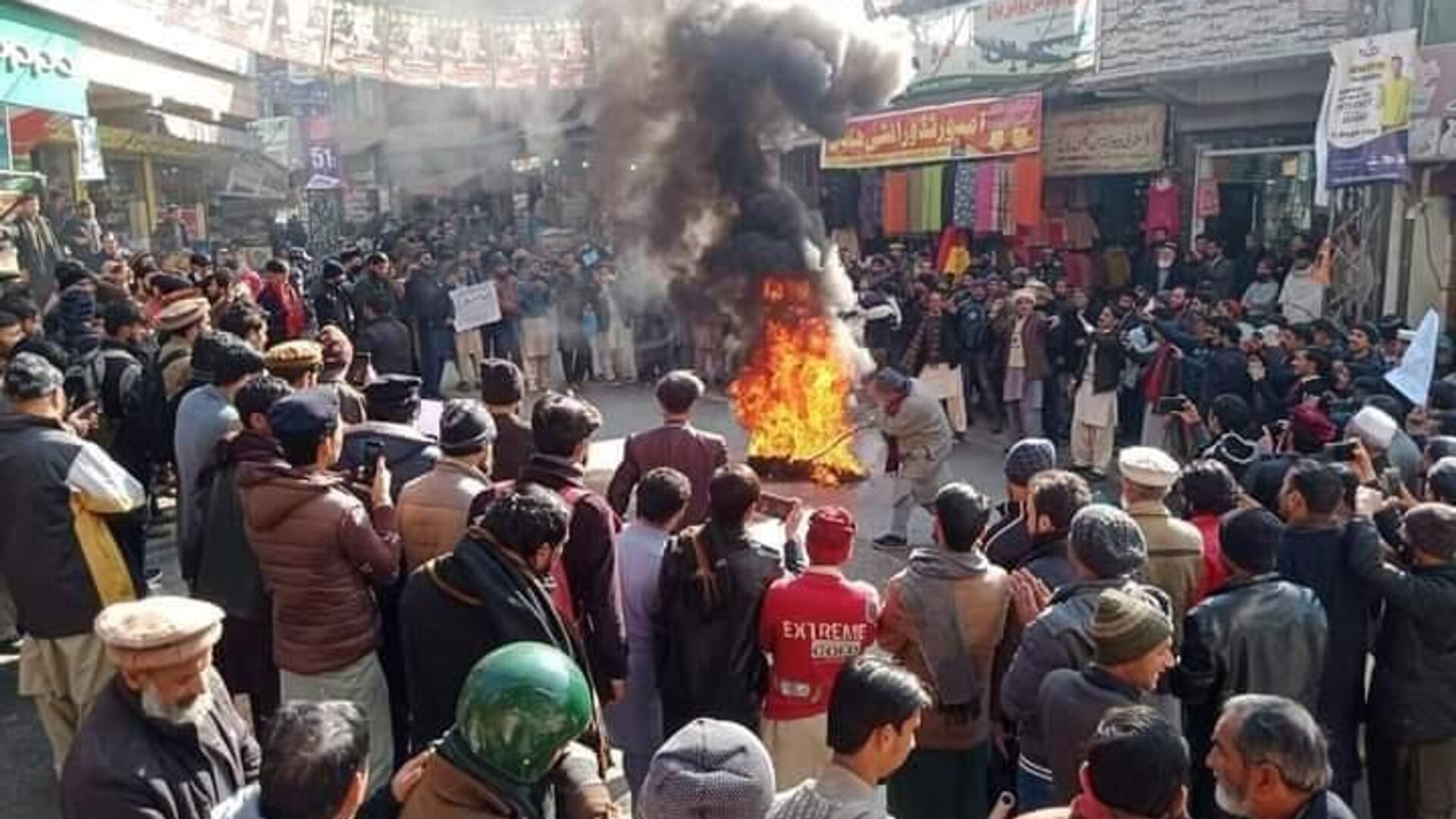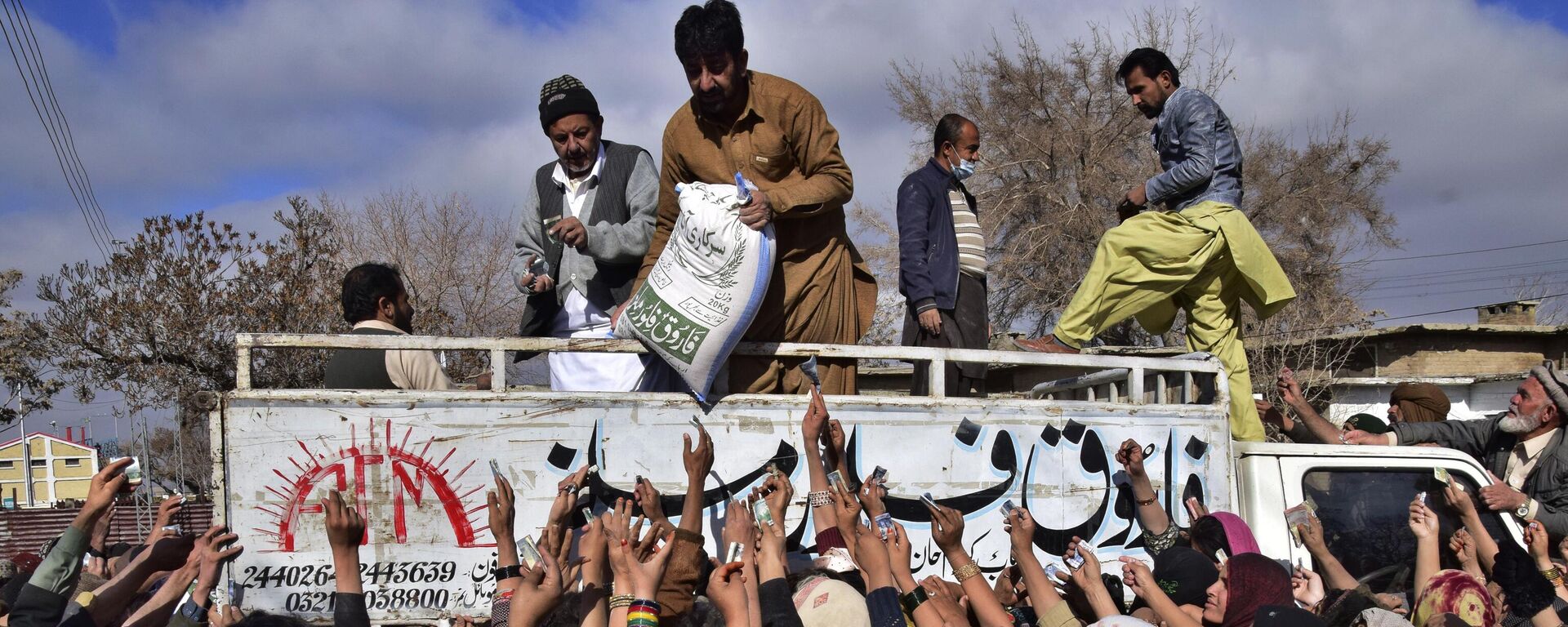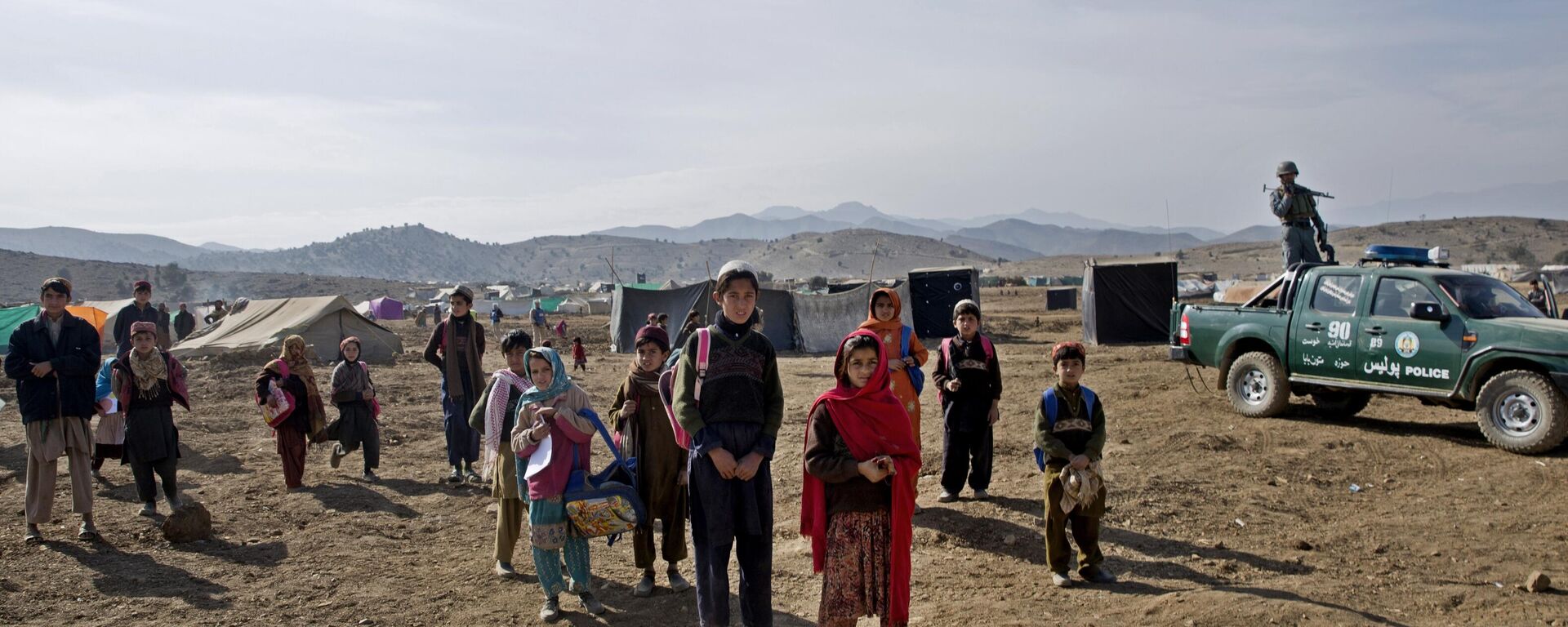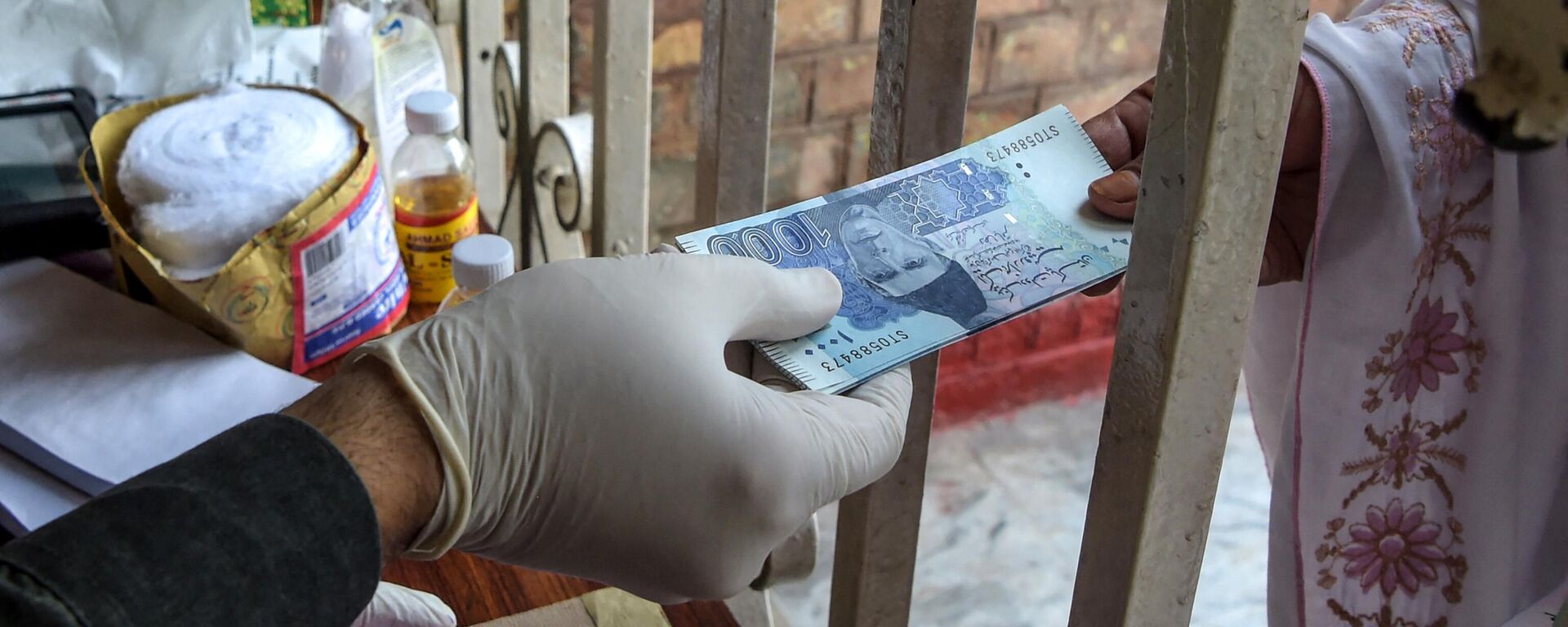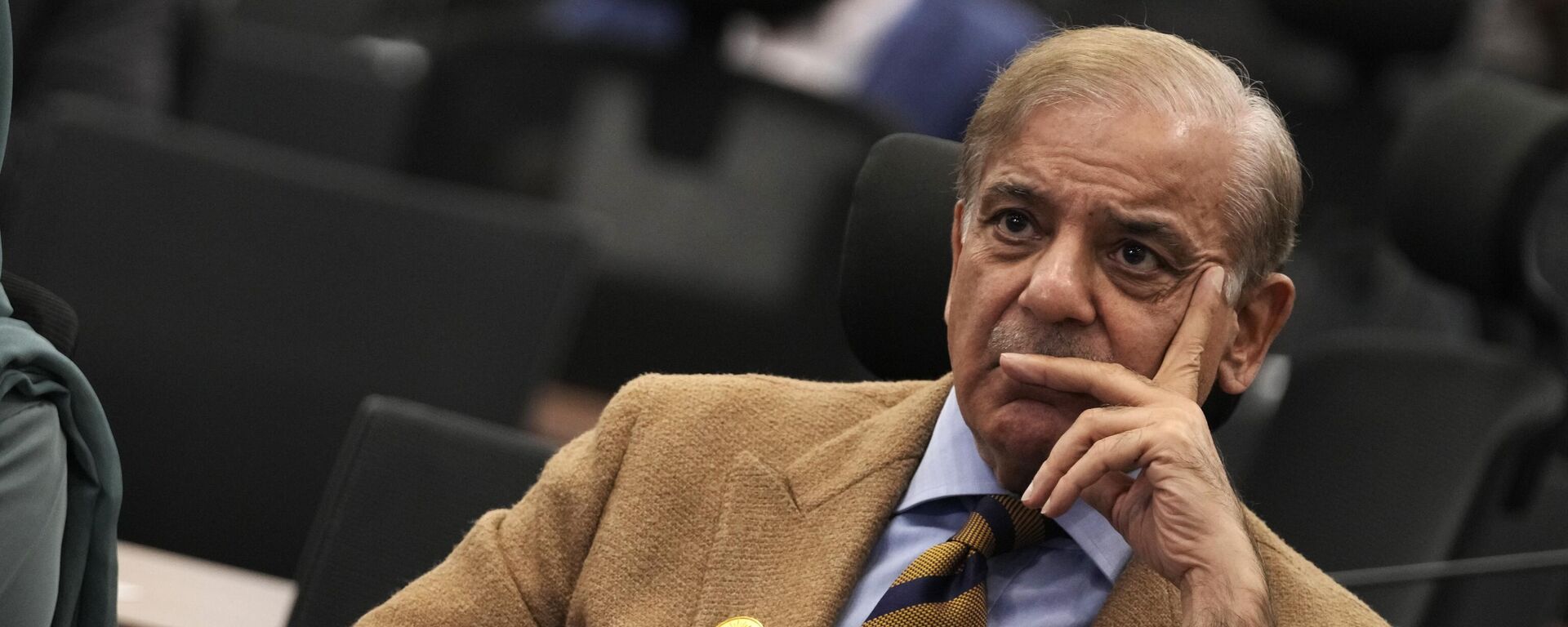https://sputniknews.in/20230117/thousands-protest-in-pakistans-gilgit-baltistan-against-inflation--govt-neglect-532487.html
Thousands Protest in Pakistan's Gilgit-Baltistan Against Inflation & Gov't Neglect
Thousands Protest in Pakistan's Gilgit-Baltistan Against Inflation & Gov't Neglect
Sputnik India
Thousands of citizens have weathered freezing temperatures to take to the streets in northern Pakistan, where a sea of people was seen in videos circulating... 17.01.2023, Sputnik India
2023-01-17T18:28+0530
2023-01-17T18:28+0530
2023-01-17T18:28+0530
world news
pakistan
protests
economic crisis
energy crisis
food crisis
gilgit-baltistan
https://cdn1.img.sputniknews.in/img/07e7/01/11/534795_0:68:720:473_1920x0_80_0_0_27a8f74ace78cb73d7b0ab2075f99b85.jpg
Massive protests have broken out in Pakistan's northern region of Gilgit-Baltistan (GB) over inflation and what they consider to be a lack of government attention.Marches have been witnessed in the districts of Hunza, Nagar, Ghizer, Diamer, Astore, Shigar, Ghanche, and Kharmang.Disputed Region of the Tallest PeaksGilgit-Baltistan, also known as the Northern Areas, is an "administrative territory"— in contrast to Pakistan's other four provinces. It constitutes the northern portion of the larger Kashmir region, which has been the source of a major dispute between India and Pakistan since 1947.The region is highly mountainous and is home to some of the tallest peaks in the world, including K2 and more than fifty peaks above 7,000 meters. It has a population of some 1.5 million people.For some years now, much of the population of Gilgit-Baltistan wanted the territory to become completely integrated with Pakistan as a fifth province in the hope of getting better opportunities and quality of life, all the while opposing integration with the rest of the Kashmir region.The Pakistani government, however, has rejected calls to grant it provincial status on the grounds that such a move would threaten Pakistan's demands regarding the entire dispute over Kashmir.That said, in November 2020, former Pakistani Prime Minister Imran Khan announced that Gilgit-Baltistan would attain provincial status after the 2020 Gilgit-Baltistan Assembly election.Pakistan's neighbor, India, did not welcome such a proposal, taking the matter to the United Nations. It claimed that if GB became a fifth province of Pakistan, it would only worsen the Kashmir issue for Indian authorities.One way or another, after Imran Khan was ousted from power, the issue of Gilgit-Baltistan acquiring provincial status took a backseat.New 'Draconian' BillGilgit-Baltistan is a strategically important region in South Asia: it borders Azad Kashmir to the south, the province of Khyber Pakhtunkhwa to the west, the Wakhan Corridor of Afghanistan to the north, the Xinjiang region of China to the east and northeast, and the Indian-administered union territories Jammu and Kashmir and Ladakh to the southeast.Despite its strategic importance, abundance of mineral resources, natural beauty and status as a tourism hotspot, the region has been gripped in political chaos as locals feel neglected by Islamabad.During recent protests, crowds can be seen chanting slogans against the Pakistani administration as the plights of people in the region allegedly remain neglected. The last couple of weeks have united the region's geographically and religiously diverse communities, as well as supporters of different political parties.There are many reasons why people were forced to take to the streets, but one of the main issues is the fact that Pakistan's government has introduced a Gilgit-Baltistan Revenue Authority Bill 2022 which has imposed new taxes on 135 items.The locals are calling the bill "draconian" as traders express their discontent over the new legislation when they took to the streets holding placards. Syed Mehdi Shah, the governor of Gilgit-Baltistan, vetoed the bill in September 2022 after it was originally approved by the assembly in August. It was reported at the time that Mehdi Shah declined to sign the legislation and sent it back to the assembly for consideration.However, the bill was reportedly reintroduced in the assembly and was recently approved for the second time, thereby turning it into law. According to protesters, the bill will negatively affect people, especially low-income families. It came at a time when people and business owners were already suffering losses due to prolonged electricity shortage in the region.According to reports, some power outages have devastated areas by up to 12 hours. It should be noted that power outages are prevalent across Pakistan and not only in Gilgit-Baltistan.However, GB’s ambiguous constitutional status and lack of infrastructure compared to the rest of the country makes this region’s struggles unique.Illegal Land-GrabbingThe locals in GB have serious concerns about the government taking over land that they claim "belongs to the people" for infrastructure projects, including the highly promoted China-Pakistan Economic Corridor (CPEC).Despite being a gateway to the CPEC, locals are prevented from speaking out about matters concerning the federal government.People feel that the state has been openly misusing ‘Khalsa Sarkar’ laws for land-grabbing in GB, adding that the law states that the federal government could claim ‘ownership of barren or uncultivated land’ in GB even if it was collectively owned by the local community.Khalsa Sarkar is a historic term that refers to when the Sikh Empire was formed under Ranjit Singh which lasted for 50 years in the region. The empire was officially known as Sarkar-iKhalsa. The Sikh invasion of Gilgit-Baltistan and its subsequent attacks for the occupation of the lands were referred to as the Khalsa Sarkar lands. These lands included farms, deserts, barren territories and fertile soils.Today, the residents of GB are blaming the current Pakistan's government for doing the same as the Sikhs.In his book “Gilgit Ki Roug Kahani”, Professor Usman Ali described the atrocities committed by Sikhs, Rajas and Dogra rulers on the people of Gilgit. Dogras levied extensive taxes and introduced different concepts like ‘kar-begar’ forced labor, ‘begar-doodh’ tax on milk, ‘Hukmi Kharid’ forced purchase of grain from farmers.Hence, the exploitation of GB and its people is not a new concept — it has been ongoing since the time of the Indian Subcontinent.Nowadays, people complain that Khalsa land has been occupied by influential people or allotted to individuals by courts or distributed among communities. They have been raising their voice for years but their plight falls on deaf ears.A resolution was tabled by the opposition in the Gilgit-Baltistan Legislative Assembly (GBLA) demanding the revocation of this colonial concept and to accept the rights of locals over the ownership of lands. The opposition parties termed these rules as unconstitutional and against Islamic principles.While the state has a right to acquire land it feels is vital for the national interest, the people need to be taken on board and compensated fairly, and no forced takeovers of land should occur.Exploitation of the CrisisDespite the current issues, it should be kept in mind that many people in GB consider Pakistan their home.Each time such protests take place, neighboring countries try to take advantage by exploiting the issue in their media.During the recent protests in GB, netizens were quick to suggest that it has been "illegally occupied by Pakistan" and that the people want it to become part of India, fueling hate and misunderstandings on both sides. All the misconceptions and issues need to be addressed while taking all stakeholders on board, especially the people of GB.Considering that the people of GB have united over these issues, the government of Pakistan needs to engage with them, listen to their concerns and reach mutually agreed solutions.The views and opinions expressed in this column are those of the author and do not necessarily reflect the position of Sputnik.
https://sputniknews.in/20230116/debt-or-trap-will-billion-dollar-international-pledges-help-rescue-pakistans-economy-512781.html
https://sputniknews.in/20230114/how-british-colonizers-sowed-seeds-for-decades-long-conflict-on-afghan-pakistan-border-485779.html
https://sputniknews.in/20221227/deepening-economic-crisis-is-pakistan-facing-a-financial-emergency-274685.html
https://sputniknews.in/20230117/pakistan-pm-seeks-uae-mediation-in-holding-sincere-talks-with-india-527529.html
pakistan
gilgit-baltistan
Sputnik India
feedback.hindi@sputniknews.com
+74956456601
MIA „Rossiya Segodnya“
2023
Aneela Rashid
https://cdn1.img.sputniknews.in/img/07e6/0c/0d/74548_0:0:485:484_100x100_80_0_0_821526e967ae85d041e2d30ee34fa1de.jpg
Aneela Rashid
https://cdn1.img.sputniknews.in/img/07e6/0c/0d/74548_0:0:485:484_100x100_80_0_0_821526e967ae85d041e2d30ee34fa1de.jpg
News
en_IN
Sputnik India
feedback.hindi@sputniknews.com
+74956456601
MIA „Rossiya Segodnya“
Sputnik India
feedback.hindi@sputniknews.com
+74956456601
MIA „Rossiya Segodnya“
Aneela Rashid
https://cdn1.img.sputniknews.in/img/07e6/0c/0d/74548_0:0:485:484_100x100_80_0_0_821526e967ae85d041e2d30ee34fa1de.jpg
pakistan, protests, economic crisis, energy crisis, food crisis, gilgit-baltistan
pakistan, protests, economic crisis, energy crisis, food crisis, gilgit-baltistan
Thousands Protest in Pakistan's Gilgit-Baltistan Against Inflation & Gov't Neglect
Thousands of citizens have weathered freezing temperatures to take to the streets in northern Pakistan, where a sea of people was seen in videos circulating online.
Massive protests have broken out in Pakistan's northern region of Gilgit-Baltistan (GB) over inflation and what they consider to be a lack of government attention.
Marches have been witnessed in the districts of Hunza, Nagar, Ghizer, Diamer, Astore, Shigar, Ghanche, and Kharmang.
Disputed Region of the Tallest Peaks
Gilgit-Baltistan, also known as the Northern Areas, is an "administrative territory"— in contrast to Pakistan's other four provinces. It constitutes the northern portion of the larger Kashmir region, which has been the source of a major dispute between India and Pakistan since 1947.
The region is highly mountainous and is home to some of the tallest peaks in the world, including K2 and more than fifty peaks above 7,000 meters. It has a population of some 1.5 million people.
For some years now, much of the population of Gilgit-Baltistan wanted the territory to become completely integrated with Pakistan as a fifth province in the hope of getting better opportunities and quality of life, all the while opposing integration with the rest of the Kashmir region.
The Pakistani government, however, has rejected calls to grant it provincial status on the grounds that such a move would threaten Pakistan's demands regarding the entire dispute over Kashmir.
That said, in November 2020, former Pakistani Prime Minister Imran Khan announced that Gilgit-Baltistan would attain provincial status after the 2020 Gilgit-Baltistan Assembly election.
Pakistan's neighbor, India, did not welcome such a proposal, taking the matter to the United Nations. It claimed that if GB became a fifth province of Pakistan, it would only worsen the Kashmir issue for Indian authorities.
One way or another, after Imran Khan was ousted from power, the issue of Gilgit-Baltistan acquiring provincial status took a backseat.
Gilgit-Baltistan is a strategically important region in South Asia: it borders Azad Kashmir to the south, the province of Khyber Pakhtunkhwa to the west, the Wakhan Corridor of Afghanistan to the north, the Xinjiang region of China to the east and northeast, and the Indian-administered union territories Jammu and Kashmir and Ladakh to the southeast.
Despite its strategic importance, abundance of mineral resources, natural beauty and status as a tourism hotspot, the region has been gripped in political chaos as locals feel neglected by Islamabad.
During recent protests, crowds can be seen chanting slogans against the Pakistani administration as the plights of people in the region allegedly remain neglected. The last couple of weeks have united the region's geographically and religiously diverse communities, as well as supporters of different political parties.
There are many reasons why people were forced to take to the streets, but one of the main issues is the fact that Pakistan's government has introduced a Gilgit-Baltistan Revenue Authority Bill 2022 which has imposed new taxes on 135 items.
The locals are calling the bill "draconian" as traders express their discontent over the new legislation when they took to the streets holding placards. Syed Mehdi Shah, the governor of Gilgit-Baltistan, vetoed the bill in September 2022 after it was originally approved by the assembly in August. It was reported at the time that Mehdi Shah declined to sign the legislation and sent it back to the assembly for consideration.
However, the bill was reportedly reintroduced in the assembly and was recently approved for the second time, thereby turning it into law. According to protesters, the bill will negatively affect people, especially low-income families. It came at a time when people and business owners were already suffering losses due to prolonged electricity shortage in the region.
According to reports, some power outages have devastated areas by up to 12 hours. It should be noted that power outages are prevalent across Pakistan and not only in Gilgit-Baltistan.
However, GB’s ambiguous constitutional status and lack of infrastructure compared to the rest of the country makes this region’s struggles unique.
The locals in GB have serious concerns about the government taking over land that they claim "belongs to the people" for infrastructure projects, including the highly promoted China-Pakistan Economic Corridor (CPEC).
Despite being a gateway to the CPEC, locals are prevented from speaking out about matters concerning the federal government.
People feel that the state has been openly misusing ‘Khalsa Sarkar’ laws for land-grabbing in GB, adding that the law states that the federal government could claim ‘ownership of barren or uncultivated land’ in GB even if it was collectively owned by the local community.
Khalsa Sarkar is a historic term that refers to when the Sikh Empire was formed under Ranjit Singh which lasted for 50 years in the region. The empire was officially known as Sarkar-iKhalsa. The Sikh invasion of Gilgit-Baltistan and its subsequent attacks for the occupation of the lands were referred to as the Khalsa Sarkar lands. These lands included farms, deserts, barren territories and fertile soils.
Today, the residents of GB are blaming the current Pakistan's government for doing the same as the Sikhs.
The Human Rights Commission of Pakistan fact-finding report of 2022 stressed that the Khalsa Sarkar system violated international human rights standards, such as the ‘UN Declaration of the Rights of Indigenous Peoples’, which protects indigenous peoples’ "rights to their collective bio-cultural heritage as a whole, which means traditional knowledge and resources, territories, and cultural and spiritual values and customary laws."
In his book “Gilgit Ki Roug Kahani”, Professor Usman Ali described the atrocities committed by Sikhs, Rajas and Dogra rulers on the people of Gilgit. Dogras levied extensive taxes and introduced different concepts like ‘kar-begar’ forced labor, ‘begar-doodh’ tax on milk, ‘Hukmi Kharid’ forced purchase of grain from farmers.
Hence, the exploitation of GB and its people is not a new concept — it has been ongoing since the time of the Indian Subcontinent.
Nowadays, people complain that Khalsa land has been occupied by influential people or allotted to individuals by courts or distributed among communities. They have been raising their voice for years but their plight falls on deaf ears.
A resolution was tabled by the opposition in the Gilgit-Baltistan Legislative Assembly (GBLA) demanding the revocation of this colonial concept and to accept the rights of locals over the ownership of lands. The opposition parties termed these rules as unconstitutional and against Islamic principles.
While the state has a right to acquire land it feels is vital for the national interest, the people need to be taken on board and compensated fairly, and no forced takeovers of land should occur.
Exploitation of the Crisis
Despite the current issues, it should be kept in mind that many people in GB consider Pakistan their home.
Each time such protests take place, neighboring countries try to take advantage by exploiting the issue in their media.
During the recent protests in GB, netizens were quick to suggest that it has been "illegally occupied by Pakistan" and that the people want it to become part of India, fueling hate and misunderstandings on both sides.
All the misconceptions and issues need to be addressed while taking all stakeholders on board, especially the people of GB.
Considering that the people of GB have united over these issues, the government of Pakistan needs to engage with them, listen to their concerns and reach mutually agreed solutions.
The views and opinions expressed in this column are those of the author and do not necessarily reflect the position of Sputnik.
